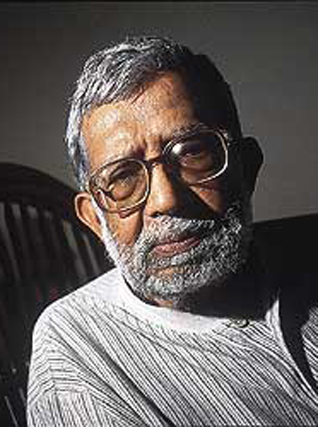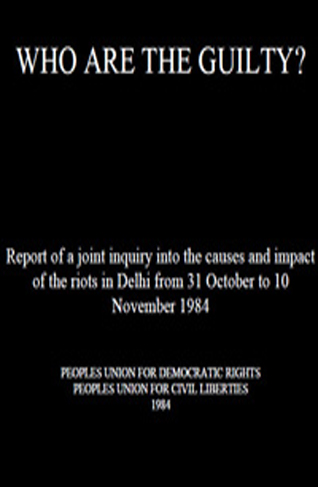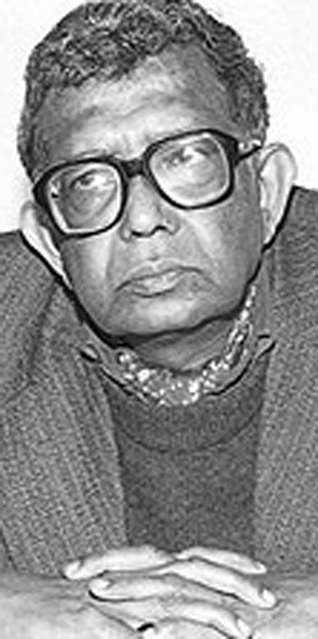Our Best Friends
In 1984 India, He Dared To Call A Spade A Spade:
Rajni Kothari 1928 - 2015
NEWS REPORTS
RAJNI KOTHARI
1928 - January 19, 2015
“Evidence from various sources is mounting that soon after Operation Bluestar and the extremist response thereto in parts of Punjab, a plan of retaliation by identifying Sikh targets ranging from households to commercial establishments to Gurdwaras had been undertaken including the planning of logistics and the techniques to be employed ...”
[Rajni Kothari wrote in 1984 -- on the anti-Sikh pogroms that began in India on November 1, 1984]
New Delhi, India
Rajni Kothari, a political scientist of commanding stature who relentlessly interrogated caste, and a tireless defender of civil liberties, passed away at his residence around 9.45 am on Monday, January 19, 2015. He was 86.
Kothari - then the President of The People's Union For Civil Liberties (PUCL) - is best remembered as the courageous co-author of “Who Are The Guilty?“, a daring factual Report stemming from a joint inquiry into the causes and impact of the anti-Sikh pogrom in Delhi from 31 October to 10 November 1984.
The Report -- jointly published by two Delhi-based human rights organizations, The People's Union For Democratic Rights (PUDR) and The People's Union For Civil Liberties in November, 1984, i.e., within a few weeks after the massacres -- remains a reliable source of information on the crimes committed by the Indian government apparatus during the period, despite the ongoing attempts by the state and media to bury the evidence since then during the last three decades.
Kothari was suffering from urinary tract infection. A family member said he was unwell for the last two years and died of age-related ailments.
Few intellectuals in India have been as admired and revered as Kothari. Foremost academics home and away posted their tributes on social media. Psephologist and former colleague Yogendra Yadav described him as "the first theorist of Indian democracy, the most outstanding political scientist India has yet produced" and "a friend philosopher and guide of peoples' movements."
Prof Ashutosh Varshney, who teaches international studies and social sciences at Brown University, called him a "great political scientist", a "lifelong fighter for democratic rights" who "inspired a generation of academics and activists."
For Pratap Bhanu Mehta, Kothari was "a defender of democracy against state, empirical over abstract, politics against its critics, and distinctive Indian modernity."
Back in 2012, Mehta had written in a newspaper that "for decades, the empirical study of Indian politics was a series of footnotes to Rajni Kothari."
An institution builder, Kothari founded the Centre for Study of Developing Societies (1963), a research institute which did pioneering work in the field of caste, identity and politics.
He was also one of the first presidents of People's Union for Civil Liberties and a former Planning Commission member.
In an article in The Hindu last October, Shiv Visvanathan wrote:
"Rajni brought his sense of Gujarati entrepreneurship to ideas. He triggered election studies inviting political scientists like Myron Wiener, Robert Dahl and Karl Deutsch to India ... He introduced a voluntary group called Lokayan which became a site for a range of grass-root imaginations ... Rajni helped seed PUCL to create a tradition of on-the-spot investigations to investigate the violence of the state. PUCL-PUDR (People's Union for Democratic Rights) produced the classic report on the 1984 riots "Who are the guilty?"
Kothari's grand magisterial work was ‘Politics in India‘. No serious student of political science, home or abroad, could afford to skip it. Kothari's other books include 'Caste in Indian Politics', 'Rethinking Development: In Search of Humane Alternatives', 'State against Democracy: In Search of Humane Governance', and 'Rethinking Democracy'.
Praveen Rai, academic secretary, Centre for the Study of Developing Societies, called Kothari's death a "passing of an era … He lived with his sons, as his wife had died earlier. We are all saddened by this tragic loss," he said. "He was a pioneer in bringing to India the concept of scientific analysis to election data," Rai said.
He was also "one of the original three members" of the team that laid down the outlines for establishing the Jawaharlal Nehru University, he added.
The only son of a well-to-do Jain trader, Kothari came into prominence after he wrote a number of essays in the ‘Economic and Political Weekly’ in the 1960s. He started his professional career as a lecturer at the Maharaja Sayajirao University in Baroda.
The Sikh community world-wide mourns his death.
[Courtesy: TNN, PTI, et al. Edited for sikhchic.com]
January 20, 2015
Conversation about this article
1: Harminder Singh (India), January 20, 2015, 11:32 PM.
May his soul rest in peace. He will be remembered for his fearless writing and truthful spirit.





